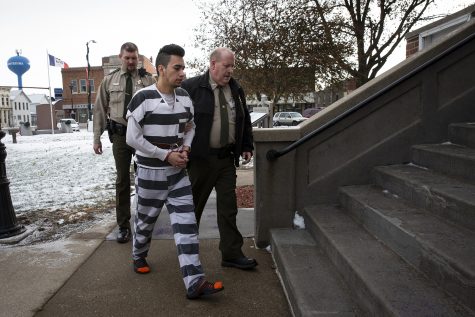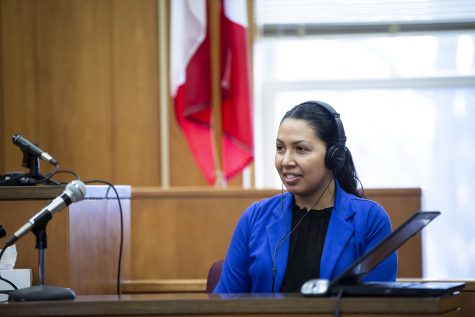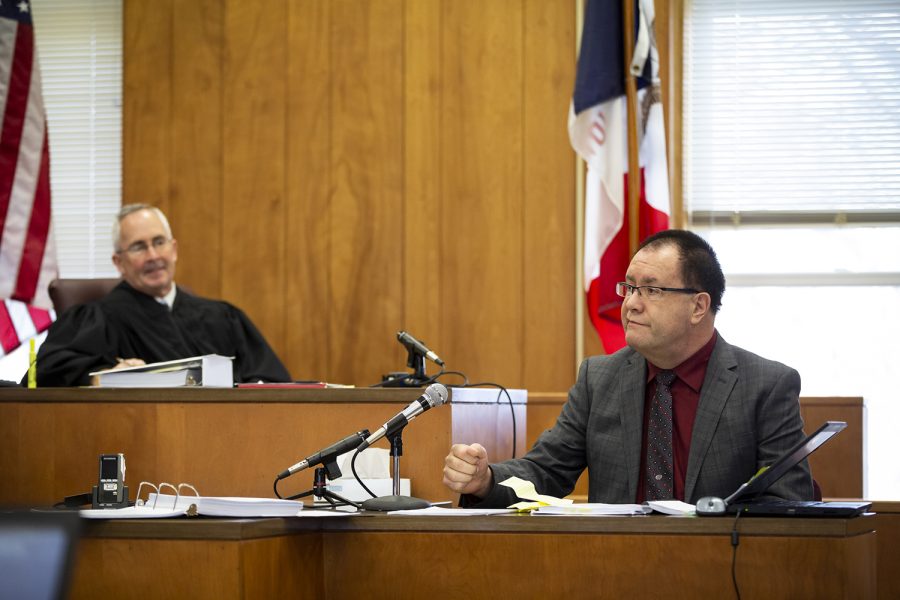Man accused of killing Mollie Tibbetts did not testify on second day of evidence-suppression hearing
At the second day of an evidence-suppression hearing Thursday centered around a law enforcement interview, Cristhian Bahena Rivera’s attorneys did not allow him to testify or be cross-examined, resulting in an affidavit written by Bahena Rivera to be thrown out of evidence.
Brian Powers/The Register
Interrogation expert Brian Leslie testifies during day two of an evidence suppression hearing at the Poweshiek County Courthouse on Thursday, Nov. 14, 2019 in Montezuma.
November 14, 2019
MONTEZUMA, Iowa — Family members of the man accused of killing University of Iowa student Mollie Tibbetts, as well as expert witnesses called by the defense, testified Thursday in the second day of an evidence-suppression hearing — but defense attorneys did not allow defendant Cristhian Bahena Rivera to testify or be cross-examined.
The defense instead submitted into evidence an affidavit with written testimony from Bahena Rivera about his arrest and questioning. Prosecutors previously filed documents objecting to the affidavit, saying that the affidavit should be thrown out of evidence if Bahena Rivera was unable to be cross-examined.
Because defense attorneys Chad Frese and Jennifer Frese did not allow cross-examination, Poweshiek County District Judge Joel Yates ruled the affidavit would not be accepted as evidence.
Bahena Rivera — who wore headphones at the hearing to hear testimony from interpreters — is accused of abducting and killing Tibbetts while she was on a run on July 18, 2018. After he led officers to her body in a cornfield on Aug. 21, 2018, he was charged with first-degree murder. He has pleaded not guilty.
Yates will give a ruling on whether or not Bahena Rivera’s rights were violated at a later time.

Cristhian Bahena Rivera walks into the Poweshiek County courthouse for day two of an evidence suppression hearing at the Poweshiek County Courthouse on Thursday, Nov. 14, 2019 in Montezuma. Bahena Rivera confessed to killing Molly Tibbetts last year but his attorneys filed a motion to suppress the confession because he was not properly read his Miranda warning during initial interviews with police.
Potential effects of sleep deprivation
Expert witnesses testified Thursday regarding Bahena Rivera’s interview with law enforcement, specifically to the potential effects of sleep deprivation.
Brian Leslie, who runs a firm called Criminal Case Consultants in New York and Canada, testified that he saw videos of Bahena Rivera’s 11-hour interview, as well as transcripts. He only focused on and considered the interview, he said, not any other part of the investigation, the blood evidence found, or the surveillance video showing Tibbetts running and the car Bahena Rivera was driving.
In a heated moment, Assistant Iowa Attorney General Scott Brown questioned why Leslie would not look at outside evidence beyond the interview when examining the case, including the DNA evidence obtained from the back of Bahena Rivera’s car that was identified as Tibbetts’ blood. Leslie responded that he was asked to focus only on the interview.
Leslie said his review of the interview video found instances of coercive interrogation tactics used on Bahena Rivera. People vulnerable to those tactics include those who are sleep deprived, he said.
“I had gone through the video very specifically — keep in mind that I don’t speak Spanish, so I was just looking at the visuals — what I was looking at specifically was the amount of times he appeared tired, sleep, fast asleep, unable to wake up. I believe there were 60 instances,” he said.
RELATED: Witnesses testify at evidence-suppression hearing for the man accused of killing Mollie Tibbetts
Testimony from law enforcement on Wednesday said Bahena Rivera did not fall asleep during the interview and was alert when answering questions.
Leslie also pointed out instances during the interview when former Iowa City Police Officer Pamela Romero, who testified Wednesday, used language in a way to relax Bahena Rivera, such as her use of the word “help.”
Romero’s questioning also suggested that Bahena Rivera followed Tibbetts because she was a young, pretty woman, Leslie said.
“’She had a body, physically fit … so then are you understanding why I’m saying you aren’t being honest? You turned around while she was running in hopes of seeing her again,’” Romero said in the transcript, as relayed by Leslie. Bahena Rivera then said in the transcript that he did not turn around to see Tibbetts again, according to Leslie.
Bahena Rivera maintained his innocence throughout the entire interview besides the last four pages of the interview transcript, Leslie said. An 11-hour interview is an extensive amount of time to be interviewed, he added.
“You’re dealing with length, you’re dealing with vulnerability, you’re dealing with techniques like this. In totality, you can’t really rely on it, in my opinion,” he said.
Bahena Rivera said during his interview that he “blacked out” during a confrontation with Tibbetts on the road July 18, 2018, Leslie asserted.
Kimberly Fenn, an associate professor in psychology at Michigan State University, said the research she does focuses on how sleep deprivation affects cognitive memory.
Fenn said her review of Bahena Rivera’s case file was limited. She was told Bahena Rivera woke up at 4:30 a.m. on Aug. 20, 2018, she said, before he worked all day and was brought to the Poweshiek County Sheriff’s Office for the 11-hour interview.
A slideshow of Bahena Rivera’s interview was shown in court. Fenn identified several moments when Bahena Rivera seemed tired and exhausted, adding she believes he fell asleep several times.
Bahena Rivera’s family members speak
Alejandra Cervantes Valle — who speaks Spanish and gave her testimony through an interpreter — said Bahena Rivera is the nephew of her husband, Delfino Valle. Between family gatherings and his job at Yarrabee Farms, Cervantes Valle said, Bahena Rivera was able to primarily speak Spanish in the U.S.

Alejandra Cervantes Valle, an Aunt of Cristhian Bahena Rivera, testifies during day two of an evidence suppression hearing at the Poweshiek County Courthouse on Thursday, Nov. 14, 2019 in Montezuma. Bahena Rivera confessed to killing Molly Tibbetts last year but his attorneys filed a motion to suppress the confession because he was not properly read his Miranda warning during initial interviews with police.
“Very shy, but in the family, he was very funny,” she said through an interpreter about Bahena Rivera, adding his personality would withdraw when around strangers.
Luis Medina, who’s related to Valle through marriage, also testified that Bahena Rivera was quiet and said he socialized primarily with others who spoke Spanish.
Valle heard Bahena Rivera was at the Poweshiek County Sheriff’s Office on Aug. 20, 2018 when her husband received a call from Medina’s wife. The couple then went to the station at 8:30 p.m. and met Medina, who’d been there for over an hour.
Medina was told twice that Bahena Rivera would only be questioned for another 15 minutes before Valle and her husband arrived. He added that law enforcement avoided him at the station.
The group waited for several hours before a female interpreter and two men met them, Valle said. Valle asked the interpreter if an attorney should be called, and the interpreter responded that it wasn’t necessary, as Bahena Rivera would be able to leave in 10 to 15 minutes.
Valle, her husband, and Medina waited at the station until 1:30 a.m. on Aug. 21, 2018 before Medina suggested leaving.
“We talked about [getting a lawyer]. The best thing is to get a lawyer because it doesn’t look right,” Medina said.
The police culture in Mexico is very different than in the U.S., Valle said. Bahena Rivera was born in Mexico before coming to the U.S. several years ago.
“So in our culture, normally if a police officer comes to talk to you, you have to agree, because there is violence regularly in Mexico, and if you don’t agree they could hit you,” Valle said through an interpreter.



